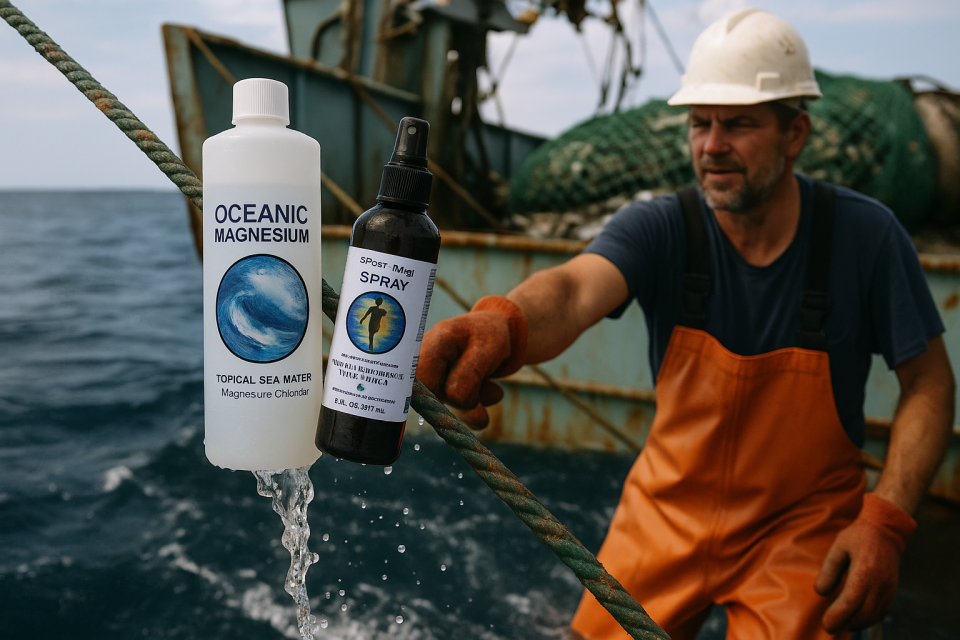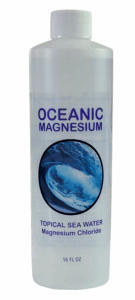Magnesium is an essential mineral that plays a crucial role in maintaining overall health. It is responsible for supporting muscle and nerve function, promoting strong bones, and providing an energy boost. Medical experts and holistic practitioners often turn to magnesium as a solution for a range of health concerns, such as muscle cramps, hypertension, migraines, anxiety, digestive issues, and heart conditions. To incorporate more magnesium into their patients’ lifestyles, they may suggest the use of seawater supplements or topical lotions and oils.
The importance of magnesium from natural mineral springs was well-known to ancient healers, who often incorporated Epsom salts into their healing baths. In line with their holistic approach, they focused on treating the entire individual rather than just specific symptoms. In today’s society, we too can find inspiration in these ancient methods by embracing natural remedies and prioritizing holistic well-being.
Liquid topical magnesium refers to a type of solution that can be applied directly to and through the skin.
Magnesium, a vital mineral for brain function and overall health, benefits various parts of our body, such as the organs, muscles, nerves, and bones. Compared to oral supplements with a low absorption rate of only 5%, liquid magnesium derived from ocean sources, such as magnesium chloride or oceanic magnesium, is highly absorbable through the skin, up to 90%.
Magnesium Chloride: This readily absorbed magnesium compound is made from magnesium chloride flakes mixed with water, resulting in a liquid that has an oily consistency, even though it is not actually an oil.1
Transdermal absorption, or the process of allowing magnesium to enter the bloodstream through topical application, takes advantage of the skin’s numerous tiny openings. These openings not only aid in eliminating toxins but also facilitate nutrient absorption. As our largest organ, the skin plays a crucial role in both these processes.
What is the process?
When oceanic magnesium is applied to the skin, it is quickly absorbed into the body. This method provides a swift way to obtain magnesium, which can alleviate various health issues that may not seem related to a mineral deficiency.
Dermal Absorption: Think of a tightly woven fabric, where up close it appears porous. This is similar to the skin, which contains millions of tiny openings that allow substances to pass through. As magnesium enters these outer layers and makes its way into the lymph and local vascular system, it eventually reaches the bloodstream.
Intercellular Skin Absorption occurs within the outermost layer of the skin, between cells.
Transcellular Skin Absorption occurs via the skin cells themselves.
A method of skin absorption, known as “Appendageal Absorption,” allows substances to be gradually absorbed through follicles and glands.
Oceanic Magnesium Advantages and Applications
When used as a topical application, liquid magnesium, specifically magnesium chloride, has numerous potential uses and advantages. It is known for its ability to alleviate muscle soreness, support skin health, decrease stress levels, and enhance the quality of sleep.
- Topical magnesium has the ability to relax muscles and ease tension, providing relief for soreness and discomfort.
- Magnesium is known to be beneficial in aiding the body’s natural relaxation response and maintaining a calm nervous system.
- Better Rest: The absorption of transdermal products could lead to an improved quality of sleep.
Magnesium oil is known for its ability to alleviate skin issues such as eczema or psoriasis. For best results, make sure to do a patch test before applying it directly on the affected areas to avoid any potential adverse reactions.
- Soothing Solution: Easily target discomfort with the direct application of liquid magnesium to affected areas1.
Some potential replacements for Over-the-Counter (OTC) products to keep in mind. Oceanic magnesium can be a viable organic alternative for products that commonly contain excessive additives through chemical processes.
- Consider using magnesium chloride liquid instead of traditional laxatives for occasional relief from constipation.
- For skin health and muscle relaxation, opt for magnesium oil or liquid when using topical creams and lotions.
- Stress-Reducing Alternatives: The calming properties of magnesium can serve as a substitute for certain stress-relieving products.
- For those who have difficulty sleeping, consider using magnesium before going to bed as an alternative to sleep aids.
More Practical Uses of Oceanic Magnesium
Consider using magnesium oil as a substitute for deodorant. Simply applying a small amount to your underarms can effectively eliminate any unpleasant odor. Unlike conventional antiperspirants, it does not inhibit sweat production, but it does aid in maintaining a pleasant scent.
For optimal hair and scalp care, try incorporating magnesium oil into your routine. This multipurpose product can help stimulate hair growth and alleviate dandruff when used as a scalp treatment. Simply massage a small amount onto your scalp and let it sit before washing your hair.
To promote oral health and combat inflammation, simply create a mouth rinse by mixing water with a few drops of magnesium oil.
For those who have overindulged in the sun, liquid magnesium provides a soothing solution for sunburned skin. Simply apply it gently to the affected areas to find relief.
To maintain strong and healthy nails, apply magnesium oil onto both your nails and cuticles. This encourages growth and improves their overall condition.
Post-workout muscle cramps and discomfort can potentially be reduced by applying magnesium oil to sore muscles as part of your after-exercise recovery routine.
It is important to seek guidance from a natural healthcare expert before incorporating any new treatments.
References and Citations:
1. Healthline: A dependable resource for learning about the advantages of magnesium oil.
2. Ancient Minerals: Their studies on topical magnesium offer valuable insights into ancient minerals.
3. Dr. Axe: Dr. Axe shares valuable insights on magnesium chloride and its impacts.
4. Kona Sea Salt: A rich source of deep ocean magnesium chloride that is ideal for transdermal application.
5. Oceanic Magnesium: Learn how to incorporate oceanic magnesium into your daily routine for optimal health benefits with the guidance of Herb Roi Richards, Ph.D.



Leave a Reply